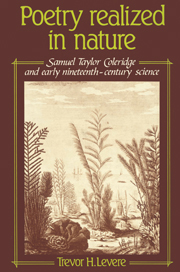Book contents
- Frontmatter
- Contents
- Preface
- Introduction: nature and mind
- CHAPTER 1 Early Years: From Hartley to Davy
- CHAPTER 2 Surgeons, Chemists, and Animal Chemists: Coleridge's Productive Middle Years From the Biographia Literaria to Aids to Reflection
- CHAPTER 3 Two Visions of the World: Coleridge, Natural Philosophy, and the Philosophy of Nature
- CHAPTER 4 Coleridge and Metascience: Approaches to Nature and Schemes of the Sciences
- CHAPTER 5 The Construction of the World: Genesis, Cosmology, and General Physics
- CHAPTER 6 Geology and Chemistry: The Inward Powers of Matter
- CHAPTER 7 Life: Crown and Culmination
- Notes
- Index
CHAPTER 7 - Life: Crown and Culmination
Published online by Cambridge University Press: 09 October 2009
- Frontmatter
- Contents
- Preface
- Introduction: nature and mind
- CHAPTER 1 Early Years: From Hartley to Davy
- CHAPTER 2 Surgeons, Chemists, and Animal Chemists: Coleridge's Productive Middle Years From the Biographia Literaria to Aids to Reflection
- CHAPTER 3 Two Visions of the World: Coleridge, Natural Philosophy, and the Philosophy of Nature
- CHAPTER 4 Coleridge and Metascience: Approaches to Nature and Schemes of the Sciences
- CHAPTER 5 The Construction of the World: Genesis, Cosmology, and General Physics
- CHAPTER 6 Geology and Chemistry: The Inward Powers of Matter
- CHAPTER 7 Life: Crown and Culmination
- Notes
- Index
Summary
Coleridge and the doctors
Coleridge's cosmos was a living one, informed by the power of life, and reaching its climax in man at the summit of the terrestrial creation. Coleridge's concern with the ascent of life complemented his probing into his own human nature and his fascination with the relations between mind and body. These interests drew him to medical works, and accidents of personality and health brought him into extended intercourse with medical men. Many of the sixty or more physicians and surgeons among his acquaintance were interested in powers, in the theory of life, in zoomagnetism, and in psychosomatic diseases.
Coleridge's brother Luke (1765–90) had been a surgeon in the London Hospital. Coleridge recalled his desire to emulate his brother: “Every Saturday I could make or obtain leave, to the London Hospital trudged I. O bliss, if I was permitted to hold the plasters or to attend the dressings, I became wild to be apprenticed to a surgeon. English, Latin, yea Greek books on medicine I read incessantly. Blanchard's Latin Medical Dictionary I nearly had by heart.” When in 1797 he stated the preparation needed for writing an epic poem, he included the acquisition of a thorough knowledge of anatomy and medicine.
His studies in Germany in 1799 took him to Blumenbach's lectures on physiology, anatomy, and natural history. When he returned to Bristol, it was to find Beddoes and Davy busy with pneumatic medicine, and with access to the patients in the Bristol Infirmary.
- Type
- Chapter
- Information
- Poetry Realized in NatureSamuel Taylor Coleridge and Early Nineteenth-Century Science, pp. 201 - 221Publisher: Cambridge University PressPrint publication year: 1981



